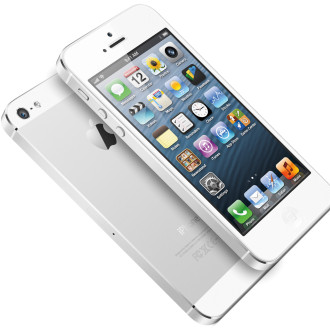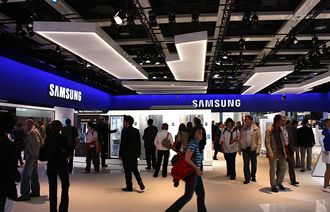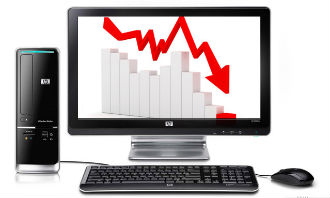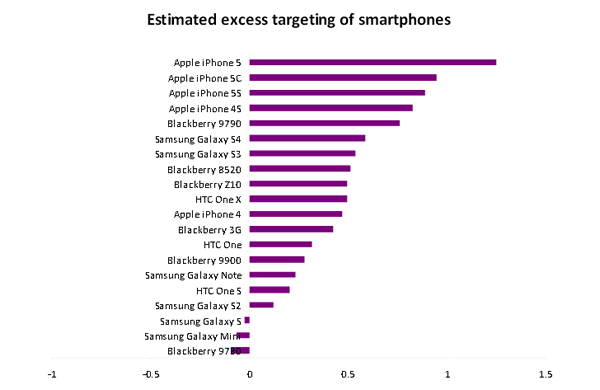Tag: mobile phones
Hutchison to buy O2
 Consolidation in the UK mobile industry is certain after Hutchison Whampoa said it will buy O2 for £10.25 billion.
Consolidation in the UK mobile industry is certain after Hutchison Whampoa said it will buy O2 for £10.25 billion.
Google takes aim at five billion people
 Software giant Google will introduce a modular mobile phone that it says will be affordable for the five billion people who don’t yet have a smartphone.
Software giant Google will introduce a modular mobile phone that it says will be affordable for the five billion people who don’t yet have a smartphone.
5G planning starts
 While most people haven’t even moved to 4G phone networks yet, manufacturers are already talking about standards for the next faster generation of 5G phones.
While most people haven’t even moved to 4G phone networks yet, manufacturers are already talking about standards for the next faster generation of 5G phones.
Major vendors are engaging with the formal standards process, according to ABI Research. Those include Alcatel-Lucent, Ericsson, Huawei, Intel, Qualcomm, Samsung, mobile operators and academic bodies.
Research director Philip Solis sad: “These companies are all waving their 5G flags, although 5G definitions and visions remain very vague. But this is not merely marketing. These companies are most certainly putting a stake in the ground that will leverage their, work, competitive strengths, and, most crucially, patents.”
He said that Qualcomm in particular is keeping its head low, but other vendors such as Apple and Google are getting actively involved.
Solis said that efforts by vendors to use their patents will be fiercer than for 4G.
But despite the competitive edge, Solis said that companies are working together “so the standardisation process can hit the ground running”.
Scientists to predict solar magnetic storms
 The danger of solar winds disrupting mobile phone service, damaging satellites and causing power grids to black out is all too real.
The danger of solar winds disrupting mobile phone service, damaging satellites and causing power grids to black out is all too real.
But teams of researchers in the USA are working on creating models that will precisely predict when geomagnetic storms are likely to threaten global communications.
At a forthcoming meeting of the American Physical Society’s Division of Plasma Physics a number of scientists from different teams will present their findings.
A team at Princeton Plasma Physics Lab will show how magnetic reconnection accelerates solar wind particles of a high energy frenzy and how that affects with the magnetic field that surrounds our planet.
A breakthrough from the US Department of Energy’s plasma physics lab appear to have discovered how massive eruptions of solar plasma turns magnetic energy into explosive particle energy, disrupting communications.
The scientists have measured experimentally the amount of magnetic energy turning into particle energy which can equal the power equivalent of millions of tons of TNT.
* The illustrations clockwise from upper left are: computer simulation of the solar wind in contact with the Earth’s magnetosphere, magnetosphere simulation experiment at Columbia University, computer visualisation of turbulent plasma currents in Swarthmore plasma wind tunnel (experiment at bottom right), magnetic surfaces overlaid on merging plasma with reconnection, and spectrogram showing interaction of magnetic waves in the UCLA Large Plasma Device.
Intel revises its pay outs for vendors
 It looks as if Intel will stop providing pay outs – in euphemistic terms – subsidies, for people making mobile phones using its technology.
It looks as if Intel will stop providing pay outs – in euphemistic terms – subsidies, for people making mobile phones using its technology.
According to Taiwanese wire Digitimes, while Intel had an apparently sparkling set of financial results recently, it is going to restrict these payouts to all but the biggest players
It is significant that despite these sparkling results, Intel’s mobile unit, as we reported yesterday, was a loss making venture. Intel beancounters don’t like making losses.
Digitimes said that Intel is concentrating on reducing costs for the bill of materials making up smartphones. The writing on the wall for Intel has been clear to the chip giant for quite some time. Vendors using ARM chips and non-Windows operating systems feel a little bit freer to pursue their own path.
According to the same report, Asustek, one of the bigger Taiwanese vendors, ordered over seven million Intel Atom processors but the level of rebates remains unclear.
Asustek will almost certainly continue getting pay offs from Intel because it’s estimated it will soak up at least fifteen million processors during the calendar year 2015.
We’re all running out of juice!
 As we’re soon going to be swamped by even more smartphones, tablets, wearable devices and notebooks there’s an urgent need for better battery technologies real soon now.
As we’re soon going to be swamped by even more smartphones, tablets, wearable devices and notebooks there’s an urgent need for better battery technologies real soon now.
That’s according to ABI Research which said that by 2019 there will be eight billion devices on the planet – a billion more than there are people right now.
If you’ve got a smartphone, you probably realise that the smarter they get the more electricity they take and that trend is going nowhere but upwards over the next few years.
ABI Research points out that the holy grail doesn’t lie with lithium and graphite batteries, nor with micro USB chargers. But it claims that silicon anode batteries from the likes of Leyden Energy and Amprius, as well as germanium based devices may hold out hope for the charging nightmare we even now face, in 2014.
“The opportunity is enormous,” said Nick Spencer, a senior director at ABI Research. “The average advanced market home has over 10 untethered devices with rechargeable batteries today.” Spencer reckons that if wearables take off, along with electric cars and the internet of things, the demand will be even greater.
But, thinks TechEye, we’ve been promised better battery technology for years and thus far no-one has picked up that particular baton. So let’s see how it all pans out.
Apple iPhone is favoured by thieves
 A report from the UK Home Office said that thieves are brand conscious and prefer stealing Apple iPhones compared to the rest of the pack.
A report from the UK Home Office said that thieves are brand conscious and prefer stealing Apple iPhones compared to the rest of the pack.
The report said over 50 percent of all phones stolen between January 2012 to January 2014 were iPhones. Other brands appealing to thieves are Blackberry and Samsung devices. People who have had their phones stolen believe the value of the personal data to be more than £760.
While vendors have made improvements to security that appear to have put off some thieves, the report analyses their effectiveness in some detail.
It suggests that the introduction of Apple iOS7 this time last year “has affected the black market value of some stolen iPhones”. An analysis based in London suggests reduction in thefts because of iOS7.
Samsung’s intro of Find my Mobile and the Reactivation Lock have also probably reduced thefts.
People worried about losing their mobile phones should register their mobile devices at no cost at immmobilise.com, use PIN locks, don’t leave your phone hanging about, install a tracker app. If a phone is stolen, it should be reported to the network straight away, and report it to your local cop shop.
Samsung sees profit dent
 Giant chaebol Samsung said its profit fell in the quarter between October and December.
Giant chaebol Samsung said its profit fell in the quarter between October and December.
Although it delivered net profit of £4 billion, it faces competition on its successful mobile phone francise.
In addition, it was also hit by currency movements and paid out a big bonus to its employees to celebrate 20 years of its glorious chairman’s hand on the tiller.
Mobile phone revenues fell by 18 percent compared to the previous quarter in 2013.
It warned that competition on the mobile phone front would get tougher in 2014 but of course it is still a big player in the game.
Android to hit one billion users
 A report from market research company Gartner said gadgets including PCs, tablets, ultramobile and phones will grow by 7.6 percent this year.
A report from market research company Gartner said gadgets including PCs, tablets, ultramobile and phones will grow by 7.6 percent this year.
And the Android OS is set to exceed a billion users during the course of the year. By 2017, Gartner said, 75 percent of Android volumes will come from emerging market.
It’s not good for companies tied to the traditional PC market however. Ranjit Atwal, a research director of Gartner, said users were moving away from traditional PCs such as desktops and notebooks and the better flexibility of hybrids, tablets and light notebooks are seen as better by many.
Gartner says 1.9 billion mobile phones will ship this yer, and smaller tablets will edge larger tablets out and compete with hybrids, said Atwal.
The report shows an inexorable move away from PCs – both notebooks and desktops from 341,273 thousands of units in 2012 to 268,491 thousand in 2015.
The tablet market will grow by 47 percent this year with lower average selling prices. The PC market will be flat this year, but will get a boost from Windows ultramobiles.
Mobiles fell in 2012
 Global mobile phone sales declined in 2012 as a result of the economic climate and intense market competition Gartner has said.
Global mobile phone sales declined in 2012 as a result of the economic climate and intense market competition Gartner has said.
In its latest report the analyst company said that 2012 mobile phone sales hit 1.75 billion units, a decline of 1.7 percent from 2011. And it was smartphones that bolstered this number with the fourth quarter of last year marking a record sale rate of 207.7 million units, up 38.3 percent from the same period last year.
The last time the worldwide mobile phone market declined was in 2009 and this year’s dismal results were as a result of tough economic conditions, shifting consumer preferences and intense market competition weakened the worldwide mobile phone market this year, the company said.
It added that feature phones were neglected with a 19.3 percent decline in 2012. And there was bad news for this sector with the company predicting that 2013 would continue to see a decline.
Smartphones were given a better future with the company claiming that sales of these would be close to one billion units in 2013, while overall mobile phone sales were estimated to reach 1.9 billion units.
And this market also bought in the bucks for manufacturers with Apple and Samsung both seeing their market shares in this sector rise. However, it was Samsung who had the last laugh ending up in first place for overall mobile and smartphone sales in 2012. Gartner said this was as a result of the company’s ability to build products based on broad needs.
But Samsung was warned that there could be trouble ahead with Gartner’s crystal ball predicting that competition would intensify in 2013 as players such as Sony and Nokia improved.
Huawei also had a good fourth quarter, helping it to take on third position for the first time in the smartphone sales race. The company sold 27.2 million smartphones, up 73.8 percent from 2011, while its Ascend D2 and Mate models were tipped to drive further sales for 2013.
Nokia’s handset sales improved from a good response to its Asha mobile phones and the launch of the latest Lumia Windows Phone 8 models.
However, this wasn’t enough to stop Nokia to lose further market share, totalling 18 percent, the lowest it has ever been. In 2012, Nokia reached 39.3 million smartphone sales worldwide, down 53.6 percent from 2011.







